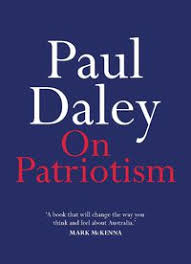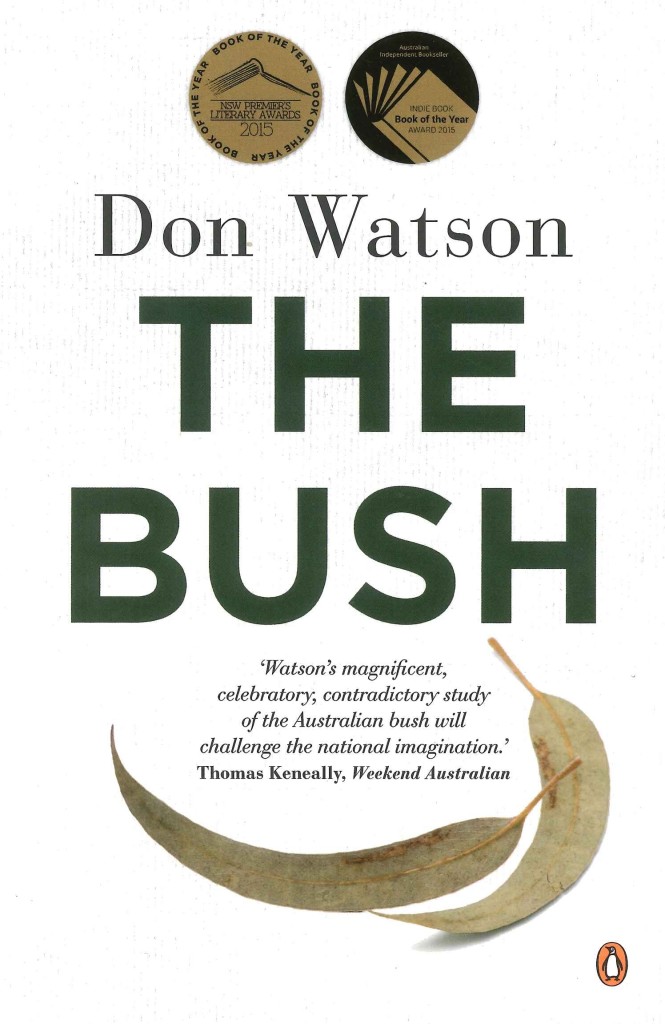‘Paul Daley and Don Watson address the place of place in the Australian story – as well as death and the Australian character’, Honest History, 7 June 2019
Sunday papers contain long reads and thoughtful essays, some of which deserve special note. One such appeared in Guardian Australia last weekend. Journalist and author Paul Daley wrote about his conversation with historian and author Don Watson, which had kicked off at the Adelaide Writers’ Festival. If you have not read the piece, you should, and we will here only touch on a few points of special interest to Honest History.
 Paul Daley first. He has been a fellow traveller with Honest History since the beginning. His April 2013 chat with Clare Wright and Jonathan Green about what Australia would be like without Anzac was one of our ‘founding documents’. He was a natural to launch our Honest History website in November 2013. On that occasion he remarked that Honest History ‘is about Anzac and Federation. It is about colonial frontier war and Eureka. It is about Australia’s politics, Labor and conservative. It is about exploration and innovation and so much more. It is about success and failure. It is about the good and the bad – the light and the shade.’ We’ve added the emphasis as Daley spoke the words. Right on!
Paul Daley first. He has been a fellow traveller with Honest History since the beginning. His April 2013 chat with Clare Wright and Jonathan Green about what Australia would be like without Anzac was one of our ‘founding documents’. He was a natural to launch our Honest History website in November 2013. On that occasion he remarked that Honest History ‘is about Anzac and Federation. It is about colonial frontier war and Eureka. It is about Australia’s politics, Labor and conservative. It is about exploration and innovation and so much more. It is about success and failure. It is about the good and the bad – the light and the shade.’ We’ve added the emphasis as Daley spoke the words. Right on!
Daley wrote a chapter for The Honest History Book and we titled it ‘Our most important war: The legacy of frontier conflict’. He referred there to the story of Douglas Grant, Indigenous Digger and outcast, and he – like us – was pleased this week to note the discovery of a long-lost bust of Grant, done in Germany while he was a Prisoner of War.
We have linked to many Daley pieces over the years, including his memorable 2016 piece on how Australian patriotism was not about war but about our love of the land. Our Place. ‘For a century now, but with increasing emphasis in the past few decades, Australian history and culture has become increasingly militarised’, Daley said. Yet, ‘the Indigenous experience of loving one’s country is closest to the purest form of Australian patriotism I can find’.
We were pleased at our five year symposium late last year to hear from Daley again and to note that his essay, On Patriotism, for Melbourne University Press – launched by the ABC’s Michael Brissenden at the symposium – was dedicated ‘To Honest History’. Reviewing the essay, I said this:
What Daley offers … is a way of grounding ourselves in something truly Australian, finding ourselves in a place where we belong, not in the artificial spaces of Anzackery spawned in another hemisphere. He wants us to connect to “a continent so storied, one with a spirituality and civilisation history as deep as it is ancient”. He wants non-Indigenous Australians to “accept the invitation [from Indigenous Australians] to stop, think about and proudly accept that this is all part of a narrative bringing their lives and those of their ancestors into perspective too”.
Don Watson has been harder to pin down. I remember an intricate – and ultimately fruitless – struggle with Penguin to get permission to print on the Honest History site a ‘highlights reel’ from Watson’s 2014 book, The Bush: Travels in the Heart of Australia. We reckoned that post would have helped sell a few copies of the book. We were still able to say that the book ‘joins the collection of many books on the Honest History website about things and influences which are said to have made us what we are, from war to depression, bushfire to beaches, camping to mining’. Our Place leaps out of the book:
In three chapters in the middle of the book, for example, Watson muses about Gippsland, Byron Bay, Lismore, the Mallee, the saltbush plains, unlocking the land, squatters and selectors, Goyder’s Line, drought, Soldier Settlement, irrigation schemes, the Murray-Darling Basin, frontier towns, dying towns turning to tourism, farming compared with mining, land reclamation, what rain does to the landscape, climate change, evolution, Narrandera and Walgett.
All of these, at a venture, along with the Frontier Wars and dispossession, are at least as important to Australia and Australians as are our military adventures overseas – which have produced both the Anzac legend and its noisy bastard child, Anzackery. But Watson also gave us and everyone a wonderful couple of lines on the language of politics, which we were pleased to work into The Honest History Book and riff off:
Honest History has been an advocacy group – for contestability in history, for balance and for honesty, and against cant, humbug and spin. As author Don Watson wrote in 2016 [in Quarterly Essay no. 63], “That’s the thing about spin – or what goes under the banner today of ‘communications’ – you begin to believe your own bullshit. Spin is the stuff that myths are made of.” Bullshit flows relentlessly to fill the space available. Myths build Anzac into Anzackery, overshadowing the many other parts of our history that deserve examination and, sometimes, celebration.
But back to Our Place. Daley’s nicely rambling piece in Guardian Australia includes death and the thoughts of it brought on by the passing of friends, cancer diagnosis and chemotherapy. And remission and recovery. And family. Daley digs deep and Watson talks. ‘We also traverse spirituality, faith, the great Australian mateship legend, Anzac mythology and Australia’s failure – or refusal – to come to historic reckoning with its violent frontier and the mass killing of Indigenous people.’ There is something on Watson’s current writing projects and, as someone brought up Presbyterian, his liking for ‘a good hymn’ and the King James Bible.
And those eternal, contesting influences:
Watson’s books always find their narrative shape [says Daley], often through a fusion of landscape, natural and built, travel, experience and memory. The Bush, for example, was a journey through country (in both the Indigenous and continental sense) that challenged Australians, urban coastal plain dwellers that we mostly are, to contemplate life in the towns and the remote, lonely, often melancholic emptiness beyond. It is the bush, as a place and as a state of mind, that is as central as that other mythologised place, Gallipoli, to Australians’ storied sense of who we are.
Daley’s piece has something on the anthropologist William Stanner and his famous 1968 Boyer lectures, on massacres of Indigenous Australians, and at the end, on the enduring inadequacy and inappropriateness of Anzac as a nation-definer. ‘I think the worst thing’, says Watson, ‘is that Anzac was originally for the battalions – you know, for the people who’d fought. And now it’s become this big national thing that is poorly understood and more and more it’s like a national religion.’ Our Place has to be bigger than Anzac.
 We were pleased to include the names of both Paul Daley and Don Watson on the letter signed by 83 distinguished Australians against the $498m plan to extend the Australian War Memorial. Daley himself wrote an excoriating piece for his paper about how clever urging by the proponents of the project had ‘sucker-punched’ both sides of politics ‘into falling in behind a proposal that is unnecessary, has arguably been devoid of proper executive evaluation and has drawn the ire of everyone from the nation’s most esteemed architects, historians and writers to the memorial’s own respected former officials’.
We were pleased to include the names of both Paul Daley and Don Watson on the letter signed by 83 distinguished Australians against the $498m plan to extend the Australian War Memorial. Daley himself wrote an excoriating piece for his paper about how clever urging by the proponents of the project had ‘sucker-punched’ both sides of politics ‘into falling in behind a proposal that is unnecessary, has arguably been devoid of proper executive evaluation and has drawn the ire of everyone from the nation’s most esteemed architects, historians and writers to the memorial’s own respected former officials’.
Watson on bullshit, too, is very relevant to the Memorial project and the campaign against it. However the project turns out, it has been notable for the amount of emotive nonsense (‘therapeutic milieu’, the Director’s suit stained with mascara and tears from a bereaved service mother, the Memorial’s alleged lack of exhibition space, its alleged role of ‘guarding the family jewels’) put about in support of it. We need writers like Paul Daley and Don Watson – and Richard Flanagan, another signatory of the letter about the extensions – to continue to call out bullshit and its related blights on public policy and national history.
* David Stephens is editor of the Honest History website and co-editor of The Honest History Book. He has written many articles for Honest History; use our Search engine to find them.


Leave a Reply
You must be logged in to post a comment.